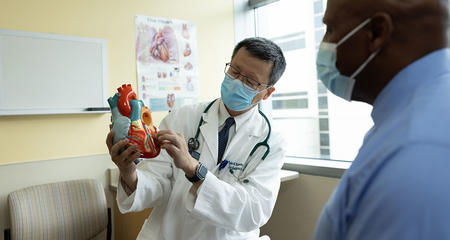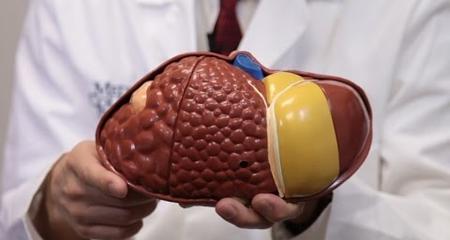The liver transplant process begins once patients and the care team managing their end-stage liver disease determine they will likely not live without replacing the liver.
Eligibility and Waiting List Evaluation
Patients start with extensive evaluation and testing by the liver transplant team to confirm the patient is healthy enough for transplant. The evaluation includes psychological and social assessment, blood tests and diagnostic tests to determine the health of the liver and overall health status.
Once the team approves a patient’s eligibility for transplant, they place the person on the liver transplant waiting list or begin live donor matching, if that is an option. For patients on the waiting list, a transplant coordinator walks them through the expectations and how to be ready for transplant when an organ becomes available. If desired, coordinators can connect patients with someone who has experienced liver transplant, so they can hear about experiences first hand. Social workers who are part of the transplant team are available to help patients plan for needs such as transportation to and from medical appointments. Patients can also access the resources of other team members, including financial advisors, registered dietitians and transplant psychologists.
Preparing for Liver Transplant
Patients on the liver transplant wait list are notified when a deceased organ becomes available, so they can get to the hospital as soon as possible.
To help make sure the liver transplant process is a long-term success, the care team helps patients prepare for transplant and stay as healthy as possible for surgery. Education about the procedure and life after transplant is part of the care plan for patients and their families.
As with any surgical procedure, patients can expect to undergo pre-operative examinations and testing and to sign surgical consent forms.
Expert Team Will Perform the Liver Transplant Surgery
Liver transplant surgery usually takes six to eight hours and is done in tandem with the living donor’s surgery, if the patient has one. We will do all that we can to schedule the surgery so loved ones have the best possible chance to be at the hospital to support the patient.
Surgery is conducted by a multidisciplinary team of surgeons, anesthesiologists, nurses, technicians and other professionals, all experienced specialists in transplant care. They prepare patients for surgery and give them general anesthesia, so they are asleep throughout the procedure.
During surgery, the team removes the diseased liver and replaces it with the donor liver or a segment of donor liver. Then they will connect the new liver with the blood supply and bile ducts. A drain may be placed in the incision site to reduce swelling. Finally, the incision will be closed and the patient can proceed to the recovery room.
Recovery from Liver Transplant Surgery
After liver transplant surgery, patients receive care in a dedicated transplant intensive care unit (TICU) at Froedtert Hospital. Nurses who staff the TICU are specially trained to care for transplant patients and organ donors. They get to know patients and their families because their work schedules are designed to provide personalized and consistent care. Post-transplant patients are seen daily by hepatologists for the medical component of their care and by surgeons for post-surgical care.
Dedicated Clinic and Care After Liver Transplant
Because patients need to take antirejection medications for the rest of their lives, we have a dedicated Transplant Clinic that provides a central place for questions, checkups and other resources after liver transplant. Surgeons, hepatologists, endocrinologists, infectious disease experts and others are available to give our patients the best possible care that meets the diverse needs they may face.
Post-transplant coordinators work with our patients to arrange every aspect of the liver transplant process and their follow-up care. By drawing on the strengths of physicians in a variety of fields, we can take care of little problems early before they become big problems.
More to Explore





